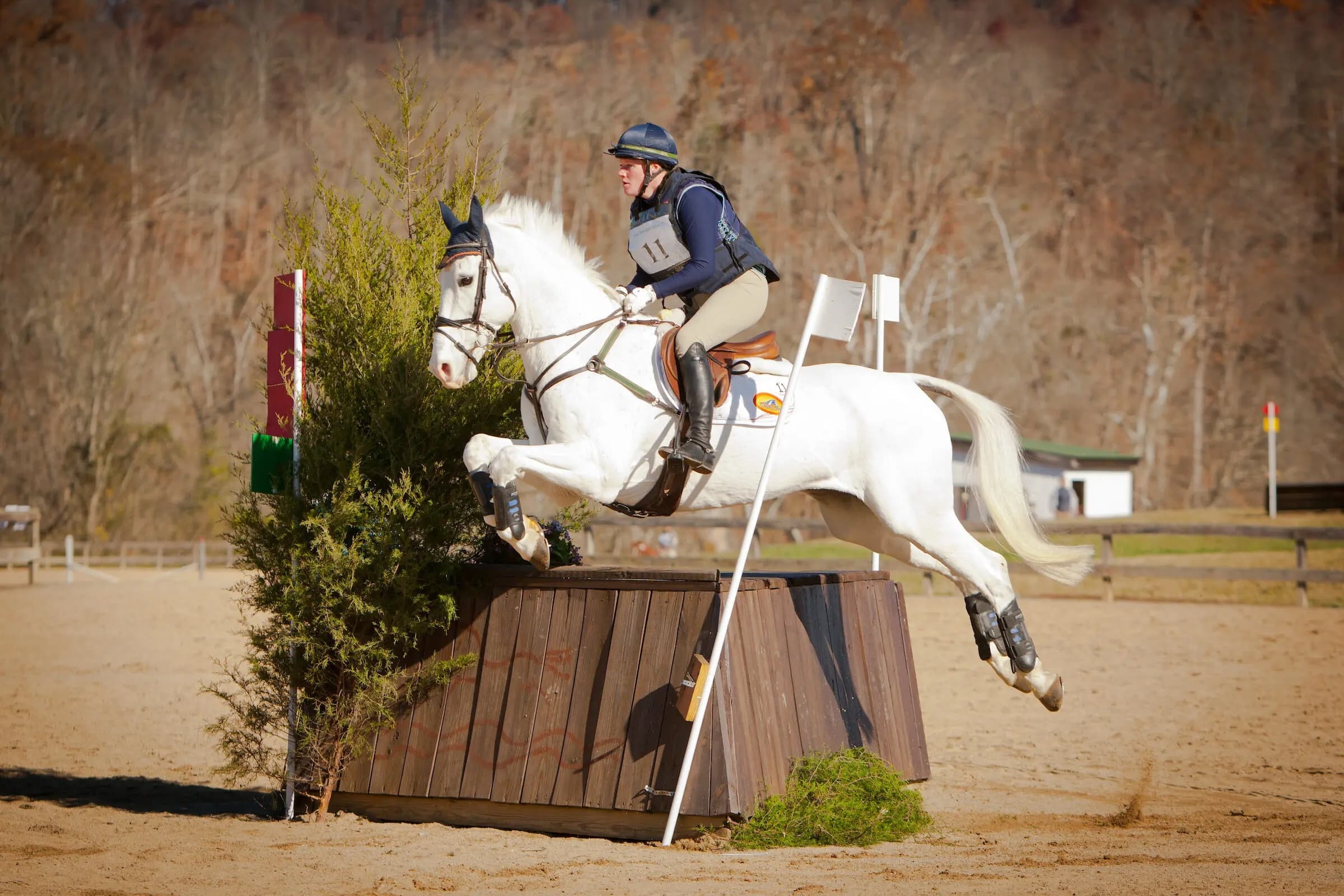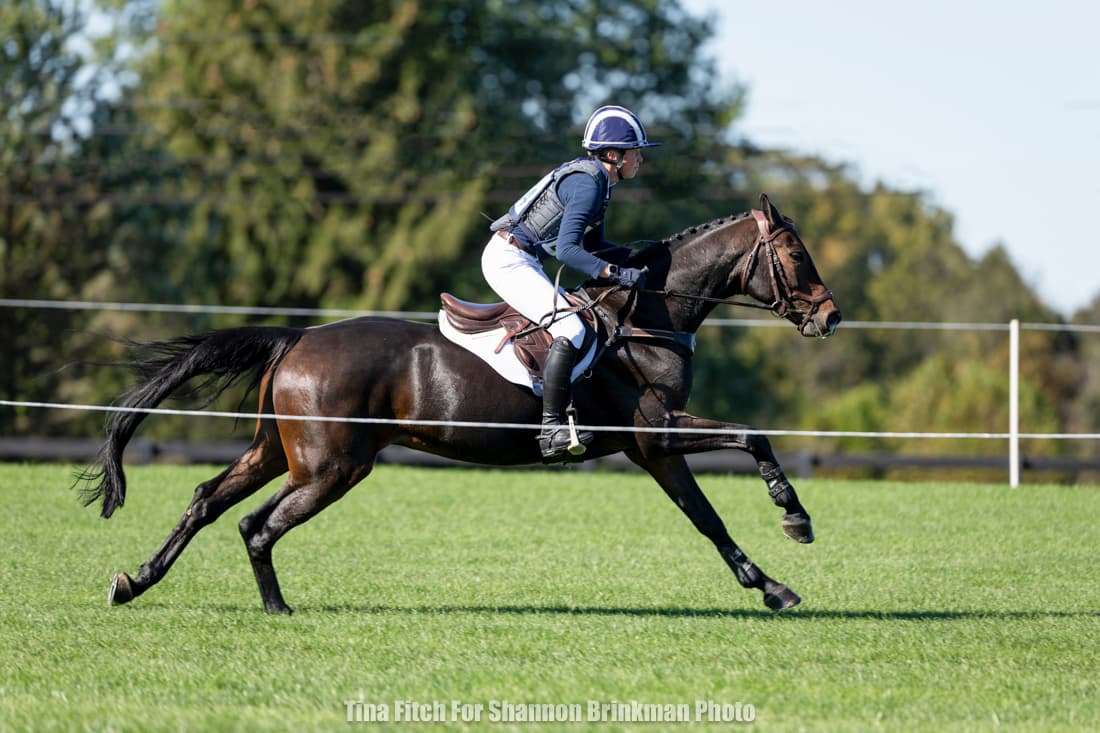USEA’s Eventing Hall of Fame: Class of 2003
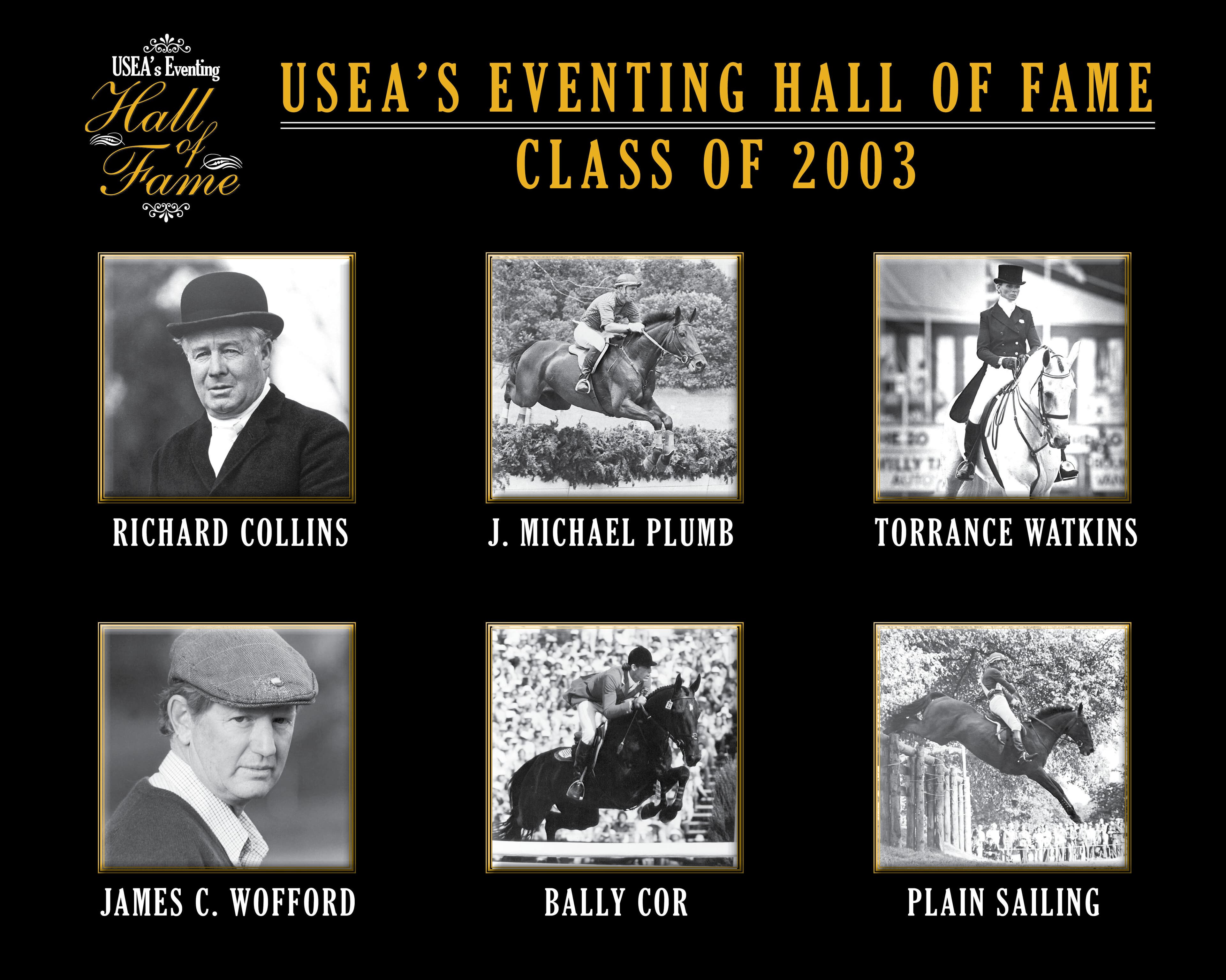
The United States Eventing Association's (USEA) Eventing Hall of Fame was established in 1999 to honor the accomplishments, contributions, and dedication of members of the eventing community who have truly made a difference to the sport. Induction into the USEA’s Eventing Hall of Fame is U.S. eventing's highest honor and recipients include past Association presidents, volunteers, riders, founding fathers, course designers, officials, organizers, horses, horse owners, and coaches.
In preparation for the 20th anniversary of the USEA’s Eventing Hall of Fame we’re taking a walk down memory lane to revisit the inductees who have joined the Hall of Fame over the years. Read on to meet the Hall of Fame Class of 2003.
Richard Collins (1908-1984)
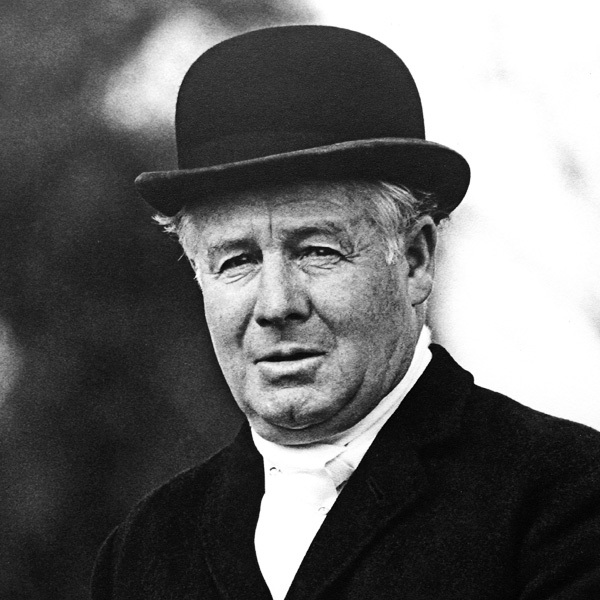
Richard "Dick" Collins attended a military school in Southern California with a strong riding program. He first became enamored with the sport of eventing while spectating at the 1932 Olympic Games and returned to his home in Pebble Beach, California with the vision of launching his own three-day event, which he did with great success at the Pebble Beach Equestrian Center (PBEC). He took over management of PBEC in 1946 and held the position until 1979.
Collins had a profound and lasting influence on a group of young riders who grew up to compete at the upper levels of eventing on the West Coast and around the country. He formed the first United States Pony Club (USPC) on the West Coast in 1954, developed a summer day camp, and each month held a horse trials which were popular with the local youth.
"Children were his real life. All young people were," explained his wife Sheila. "If you look at those young people, many stayed with horses." The summer camps and horse trials became the seeding ground for many future talents. Several of the working students that passed through Pebble Beach eventually went on to become key competitors, trainers, course designers, and organizers in the western states and beyond, among them International Equestrian Federation (FEI) course designers Pete Costello and Derek di Grazia and Olympians Kevin Freeman, Eric Horgan, and Michael Page.
While Collins never rode on an international team, he served as manager of the United States Equestrian Team's (USET) three-day eventing team at the 1955 Pan American Games in Chicago and traveled with the team's horses to the 1960 Rome Olympics.
Collins retired as manager of PBEC in 1979 and passed away five years later. The sport of eventing, on both coasts, owes a debt of gratitude to this true eventing patriot.
J. Michael Plumb
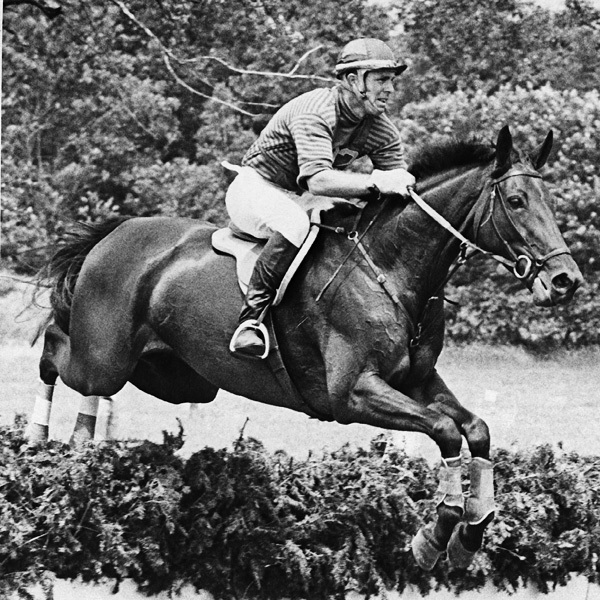
Born in 1940 in Syosset, New York, Michael Plumb got his start with the Meadow Brooks Hounds Pony Club where he earned his "A" rating. He began his career representing the U.S. in the sport of eventing at the 1959 Pan American Games, which took place in Chicago. He was named to a record eight U.S. Olympic teams, riding in his first Olympic Games in 1960 at the age of 20. He was named to every Olympic three-day eventing team from that Games through 1984, earning six medals: team silver in 1964 at Tokyo on a catch ride; team silver again in both 1968 and 1972; team gold and individual silver in 1976; and team gold again in 1984.
"Mike was the rider you wanted to go into the trenches with," said Jimmy Wofford, who rode with Plumb on the 1968 and 1972 Olympic teams. "You knew he was going to finish and that he was going to finish with a good score."
Plumb was also a member of several Pan American Games squads, winning team gold in 1963 and individual and team gold in 1967. His international career also spanned several World Championships, including team and individual silver medals in 1974 and team bronze in 1978 and 1982.
Plumb comes from a family of riders. His father, Charles Plumb, was a prominent steeplechase rider, and Plumb himself placed second in the prestigious Maryland Hunt Cup in 1977, a race his father had previously won. Plumb’s son, Charlie, has also been quite successful in eventing.
During his career, Plumb earned the USEA's Rider of the Year Award 10 times and has trained his students to achieve the same award.
Torrance Watkins
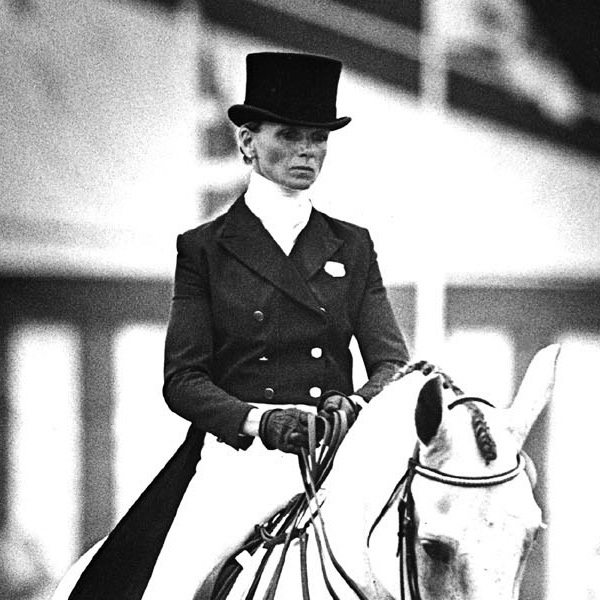
Torrance Watkins was born in 1949 to a foxhunting family and made her hunting debut at age four. After spending part of her high school years in Peru, she went on to attend the University of Denver, but, as she put it, "Wherever I went, I found horses."
She pursued that passion, making her way up the international ranks in the 1970s. She represented the U.S. in three World Championships (1978, 1982, and 1986), winning team silver in 1978 and team bronze in 1982. Watkins also brought home two Olympic medals. She won individual bronze at Fontainebleau in 1980, with the 15.1-hand Paint mare Poltroon, where she was the first female rider to win an Olympic medal in eventing. Four years after that Olympic performance, Watkins's double clean cross-country and show jumping rides on ex-racehorse Finvarra helped the U.S. team win the gold at the 1984 Olympic Games in Los Angeles. She and Finvarra finished fourth individually.
Her international career also includes a second-place finish at Burghley with Poltroon and fourth place at Badminton with Finvarra. In 1980 she was named the United States Combined Training Association (USCTA) Rider of the Year, and was named USCTA Lady Rider of the Year five times (1979, 1980, 1983, 1984, and 1985).
"I think that Torrance was the first real star that our world had," said Jimmy Wofford. "Her ride on Poltroon really captured the general public and was one of the reasons [the sport] got more air time."
Watkins' skill as a competitor opened up new career paths as a successful cross-country course designer, event organizer, and clinician. She relocated to Hardwick, Massachusetts and established a training facility at Morningfield Farm where she and partner Erik Fleming hosted the Over the Walls Horse Trials from 1999 to 2004. Watkins worked double duty as organizer and course designer for the event.
James C. Wofford
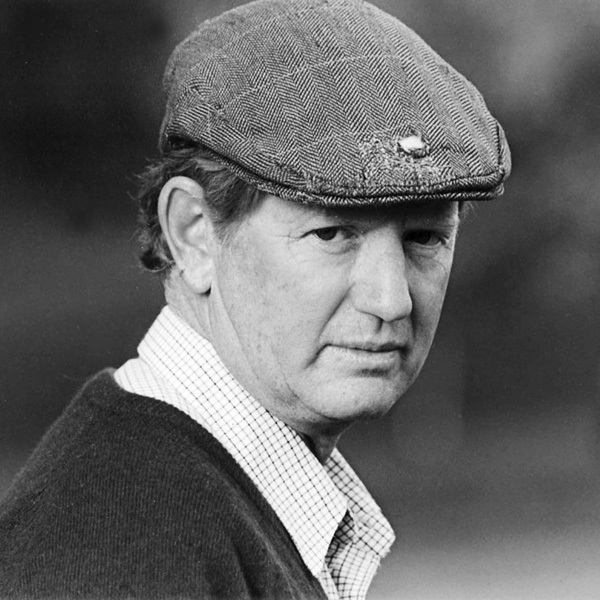
James C. “Jimmy” Wofford was born in 1944 and raised on a horse farm in Milford, Kansas. A graduate of Culver Military Academy and the School of Business at the University of Colorado, he comes from a family of equestrians. His father, Col. John W. Wofford, represented the U.S. on the 1932 Olympic show jumping team, went on to coach eventers and show jumpers at the 1952 Olympic Games, and was the founder and first president of the United States Equestrian Team. Wofford’s oldest brother, Jeb, won a team bronze as part of the 1952 Olympic three-day team, the first Games where civilians were permitted to compete in eventing. Wofford’s middle brother, Warren, was first reserve to the U.S. show jumping team at the 1956 Olympics.
Wofford was a key member of the USET’s three-day event squad for two decades, during which time he was named to three Olympic teams where he won two team silver medals and an individual silver medal, won individual and team bronze medals at the 1970 and 1970 World Championships respectively, won team gold at the 1967 Pan American Games, and five national championship titles.
At least one rider on every U.S. Olympic, World Championship, and Pan American team since 1978 has been a student of Wofford. He coached the Canadian team for the 2002 World Championship, the 2003 Pan American Games, and the 2004 Olympic Games.
Widely sought after as a clinician and coach, Wofford is equally well known as an author. He has published four books: Training the Three-Day Event Horse and Rider, Gymnastics: Systematic Training for Jumping Horses, 101 Eventing Tips, and Take a Good Look Around.
Wofford has maintained a lifelong involvement in the administration of the sport, both nationally and internationally. Wofford has served as president of the American Horse Show Association (now U.S. Equestrian (USEF)), was the first vice-president of the USET, and served as secretary of the USCTA (now USEA). He served two terms as a member of the FEI Eventing Committee, including two years as vice chairman. In addition, he has served on numerous committees during his career.
In addition to his eventing achievements, Wofford was an active competitor in steeplechase races, rode in numerous horse shows, and fox hunted for over 20 years. Wofford and his wife, Gail, live at their Fox Covert Farm in Upperville, Virginia.
Bally Cor
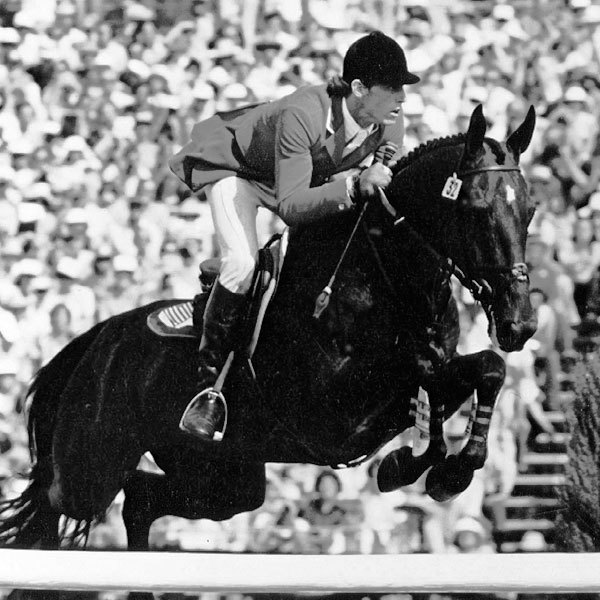
Bally Cor, sired by the steeplechaser Cormac, was bred by Dr. Charles Reid. Reid's friends, Harden Crawford, III and his wife Ailsa, bought a half interest in her as a youngster. "She was wonderful, all the way from the time we broke her," Harden said.
After getting her started as a three-day event horse, Reid and the Crawfords loaned Bally Cor to the USET where she was eventually partnered with a 21-year-old Tad Coffin. "She looked like she had something in her and we decided to give it a shot," Harden explained. Bally Cor and Coffin were incredibly successful together, winning team and individual gold at the 1975 Pan American Games, team and individual gold at the 1976 Montreal Olympics, and team bronze at the 1978 World Championships.
At first glance, many wouldn't have expected such achievements from the unassuming mare. But what she lacked in flash she more than made up for in heart and tenacity and she was solid in all three phases. As Harden pointed out, "She was somewhat short-strided so she didn't have much extension in dressage, but if the going on cross-country was trappy she was perfect."
After being retired from competition, Bally Cor went on to her second career, motherhood, and one of her successful descendants is the 2001 USEA Mare of the Year, Ballymar.
Plain Sailing
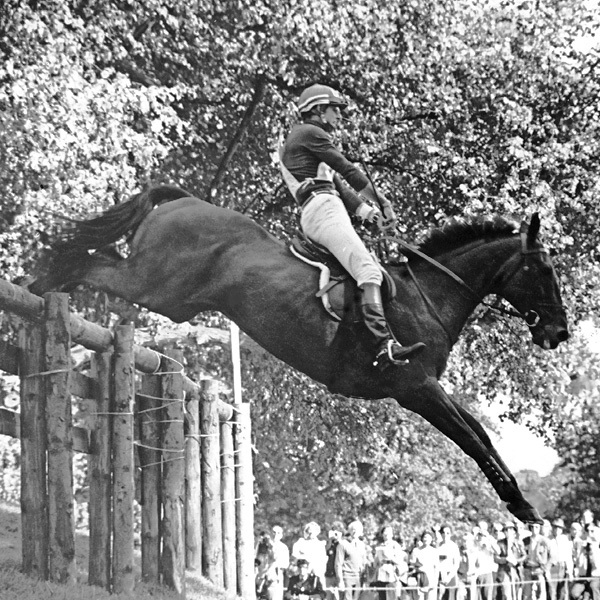
Plain Sailing's international career spanned almost a decade and several top riders. He won team gold at the 1967 Pan American Games and team silver in the 1968 Olympic Games with Michael Plumb, team silver at the 1972 Olympic Games with Bruce Davidson, and team gold at the 1974 World Championships at Burghley with Don Sachey.
"Sammy" was a bay gelding, about 16.2 hands, by an Irish stallion named Walter Serpent and believed to be out of an Irish mare. Owned by Mr. and Mrs. Raymond Firestone when he was competing, Sammy was a strong individual, a very powerful, forward going horse, and as Don Sachey said, "As honest as the day is long about jumping and had a very clear opinion about how things should be done. He was a tough ride and strong, but you could really trust him to jump. Given his competitive record, he was obviously tough as nails to have had such a vast international career and it speaks highly of his soundness and mental toughness."
On the ground, Sammy had a special relationship with his groom and facility manager, Patrick Lynch. As Sachey put it, "One never got the impression he was overjoyed to be brushed, tacked up, handled. It was more that he tolerated it. He was much more experienced and much smarter than me during our time together and I am certain he was fully aware of the advantage that he had! There were a handful of horses like Sammy from the mid-1950s through the mid-1970s that possessed the ability to do a number of international competitive cycles and truly enabled the U.S. to develop the momentum to actually hire a great coach and move us on to the success at the 1974 World Championships. Sammy was a big part of that."

